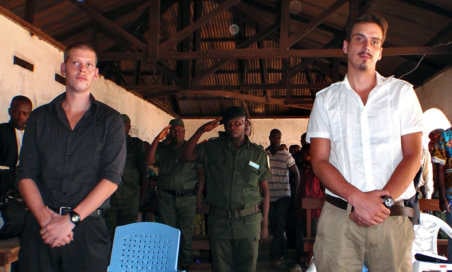MILITARY
French trial opens amid confusion in Congo
The trial of Joshua French in the Democratic Republic of Congo began in confusion on Tuesday, starting with uncertainty over its location and then grinding to a halt when the court translator was found to be inadequate.
Published: 7 January 2014 08:29 CET

Joshua French (left) and Tjostolv Moland (right) stand in court at their appeal in 2010 - Heiko Junge Scanpix
"No development here surprises me," French said ruefully after the decision was taken to postpone the trial until Friday. "I'm tired of all this now."
According to NRK, the problem with the interpreter were obvious as soon as the trial began. He had to pause frequently while he searched for the right words, only being able to continue when interpreters hired by the Norwegian press shouted out the correct translations.
"It is such a serious matter that we cannot have a translator who is not adequate," French's lawyer Hans Marius Graasvold, who petitioned the court to have the translator replaced, told NRK. "After just a few minutes it was obvious that the interpreter was not good enough."
Both Graasvold and diplomats from Norway's Foreign Ministry were notified last night that the trial would take place on Tuesday at the Supreme Military Court in Kinshasa, rather than at Ndolo Prison where French is being held.
But at 8am, just an hour before the trial was due to start, the location was suddenly moved back to a makeshift courtroom at Ndolo.
French, who has joint British-Norwegian citizenship, stands accused of murdering his friend Tjostolv Moland, who was found dead in the cell the two shared in August. The two had been in prison in Congo since 2009 after being found guilty of murdering their driver Abedi Kasongo.
A joint investigation of Moland's death by Norway's National Criminal Investigation Service and the Congolese police found that Moland had killed himself. But last month, the Congolese authorities reopened the case against French, accusing him of drugging his friend and then strangling him as he slumbered.
This contradicts the findings of autopsy which NCIS collaborated on, which found alcohol but no drugs in Moland's body.
Top Norwegian diplomat Kai Eide met Congolese President Joseph Kabila on Monday, passing him a letter from Norwegian Prime Minister Erna Solberg and British Prime Minister David Cameron.
"We expressed great concern about the situation Joshua French is in," Eide told VG newspaper. "The letter contains an appeal to the President that a way should be found to send French back to Norway."
French's mother, Kari Hilde, on Tuesday morning told NRK that she was pleased that the court seemed ready to allow Norway's NCIS to present the findings of the joint autopsy.
"If the NCIS testifies, I think the matter will go well. If they are not allowed to testify then I think we must interpret that as meaning that they have decided to convict Joshua," she said.
Earlier, she called on the British authorities to take more "serious action" in a petition to Cameron presented by the charity Reprieve.
"Joshua has already lost his best friend and nearly five years of his life," she said in a petition t. "Now he's being falsely accused of murder. How much more will he have to endure before the British Government takes serious action?"
Url copied to clipboard!


 Please whitelist us to continue reading.
Please whitelist us to continue reading.
Member comments